Contents
Market Overview
Macro Review
Still we wait for the Fed Chair appointment. President Biden is expected to announce his decision very shortly as we wait in earnest. At least some attention shifted to the Biden/Xi virtual summit as the two promised closer dialogue and sought to stabilize relations. Meanwhile, the U.S. is calling for support beyond China to release strategic oil reserves (namely, India and Japan), which weighed on crude markets (down -4-5% this week). Away from minor geopolitical events, the focus was straight back to inflation once again. This of course was not helped by the German regulator temporarily suspending the certification of the Nord Stream 2 pipeline, which sent European natural gas prices up 26%. This has been the underlying theme behind the UK’s CPI inflation and indeed the recent release of 4.2%, which also surpassed the BoE’s staff projection in the November Monetary Policy report. In fact, it was the fastest UK inflation since 2011, and cues a rate lift-off in December. Elsewhere, New Zealand’s two-year inflation expectations briefly weighed on markets. The tone from the U.S. is similar as 5yr and 10yr breakeven yields rose to all-time highs of 3.20% and 2.75%, respectively. Despite the inflation narrative, the STOXX 600 has risen 17 out of the past 19 sessions, clocking its best winning streak in months. This does not necessarily pass-through into EM equities. Polish equities are down -7% this week and below the 200dma, while Chilean stocks fared worse, down -10%. The latter comes as Chile posted its widest current account deficit since 2004. In response to inflation spiraling out of control, Hungary hiked rates by 30bp, although policy tightening has been front-loaded this year. Elsewhere, South Africa’s inflation has only shown signs of increasing lately, in part owed to labor market slack and a negative output gap, meaning inflation is well within the target 3-6% range. Almost as a matter of prudence, the South African Reserve Bank hiked rates by 25bp after the October CPI came in flat to the September reading at 5.0%. That said, the current inflation trajectory is more controlled and comparable to Asian economies. In stark contrast and as few will be surprised, the neo-Fisherism school of thought prevailed in Turkey. The Central Bank of the Republic of Turkey cut rates by another 100bp, reflecting a loosening of policy by 400bp since September. Indeed, the Turkish lira is now 32.5% weaker YTD and 15% weaker over the past month.
EM Credit Update
Emerging market sovereign credit ended the week down -0.2%. With IG down -0.1% and HY down -0.3%, as IG spreads were unchanged but HY was some 10bp wider. Lithuania, Ecuador and Argentina outperformed, while Ghana, Sri Lanka and Tunisia lagged.
The Week Ahead
Aside from G10 PMIs, U.S. GDP and PCE data, there is a full EM calendar prior to Thanksgiving. China’s loan prime rate is expected to remain unchanged next week (1yr at 3.85% and 5yr at 4.65%). Other interest rate decisions are due from Ghana (13.5%), Israel (0.5%), Nigeria (11.5%) and South Korea (0.75%), but New Zealand’s decision could move G10 rates more significantly. Given the topical trends, Brazil, Hong Kong, Singapore and Mexico will be out with inflation releases, along with UMich inflation expectations. Finally, we will also see the odd GDP print from Mexico, Singapore and Argentina.
Highlights from emerging markets discussed below include: Argentina’s midterm election delivers blow to governing coalition; Turkey’s Central Bank (CBRT) slashed policy rate another 100bps driving TRY weaker; Ghana’s Minister of Finance presents ambitious 2022 budget; and Global emerging markets corporates in focus: How do you solve a problem like inflation?
Fixed Income
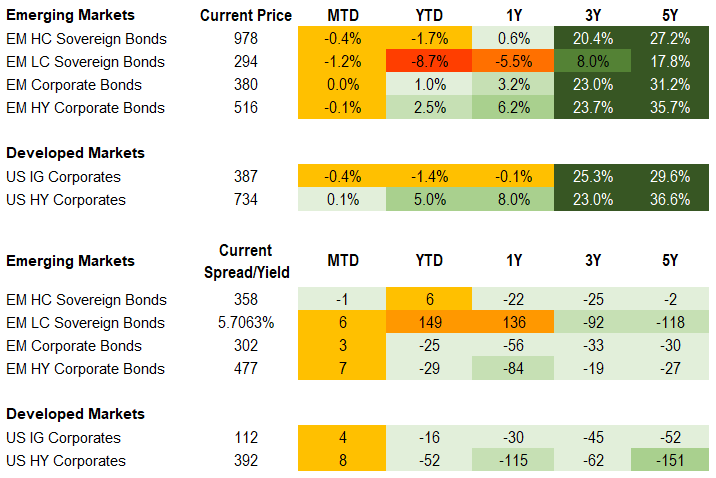
Equities
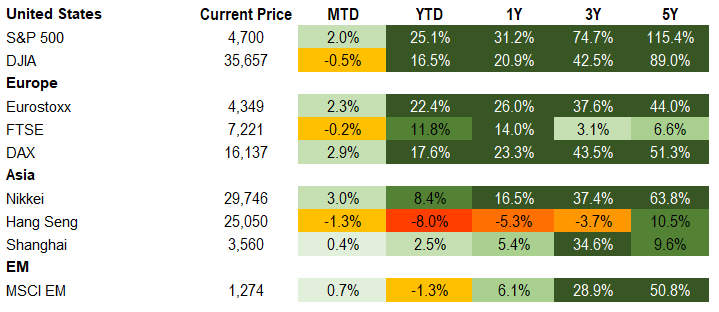
Commodities

Source for data tables: Bloomberg, JPMorgan, Gramercy. EM Fixed Income is represented by the following JPMorgan Indicies: EMBI Global, GBI-EM Global Diversified, CEMBI Broad Diversified and CEMBI Broad High Yield. DM Fixed Income is represented by the JPMorgan JULI Total Return Index and Domestic High Yield Index. Fixed Income, Equity and Commodity data is as of November 19, 2021 (mid-afternoon).
Emerging Markets Weekly Highlights
Argentina’s midterm election delivers blow to governing coalition
Event: The midterm vote held on Sunday yielded a significant loss at the national level for the ruling Frente de Todos (FdT) coalition with support of 34% compared to the opposition Juntos por el Cambio (JxC) at 42%. The government lost its majority in the Senate with just 35 seats down from 41 seats as well as the governorship of the economic and politically important Province of Buenos Aires. Following the election, President Alberto Fernandez announced plans to present a new multi-year economic plan in early December.
Gramercy Commentary: The outcome reflects the population’s rejection of economic and crisis management of this Administration and is an initial step towards regime change in the October 2023 Presidential Election. We see the multi-year economic plan as an opportunity to set the foundation for an IMF agreement in 2022. If this is the case, we would expect the authorities to show intent and supportive measures for further incremental fiscal consolidation relative to the budget as well as policies to begin to address growing macroeconomic imbalances and pervasive inflationary pressures. While we see a strengthened opposition as offering a check against more extreme heterodox policies, the political environment is likely to remain challenging and noisy, complicating IMF negotiations and a material shift to more pragmatic policies in the near-term. As such, we see room for volatility in the run-up to a deal amid the fragile macroeconomic backdrop but ultimately expect an agreement to be reached that should support bond prices.
Turkey’s Central Bank (CBRT) slashed policy rate another 100bps driving TRY weaker
Event: On Thursday, the CBRT reduced its main interest rate to 15% from 16% and stated that they will consider further reduction in December. Amid deepening negative real rates, the lira touched 11.4 per USD immediately following the action before retracing to just below 11 per USD later in the day.
Gramercy Commentary: While the cut was technically market consensus, expectations began to shift to a smaller move throughout the week which in combination with prospects for another reduction next month, likely drove the material FX weakness. The reaction function of domestic savers/investors, the trajectory of inflation, and the increase in the current account continue to be key market signposts. Onshore ex-post real interest rates are increasingly negative (~-5%), which has historically triggered stronger dollarization tendencies by domestic economic actors. This remains a downside risk for the battered TRY and we cannot exclude a potential breakdown in domestic market confidence that has remained resilient thus far in the face of a consistently deteriorating economic policy environment. If dollarization picks-up through year-end amid the current policy mix and FX weakness, the prospects for an eventual policy pause or reversal should begin to improve. Given the likelihood for continued near-term volatility combined with our more constructive medium term outlook, we continue to watch for tactical opportunities in the event a market dislocation occurs.
Ghana’s Minister of Finance presents ambitious 2022 budget
Event: On Wednesday, Minister Ken Ofori-Atta delivered the 2022 budget which envisages significant fiscal consolidation of 4.7% of GDP to 7.4% of GDP largely through revenue enhancement measures. Under these targets, the authorities’ plan to issue less than $1bn in Eurobond financing next year.
Gramercy Commentary: We see the budget as mixed with a constructive stance on the Administration’s recognition of the need for significant fiscal improvement next year and over the medium term, however do think the government will struggle to achieve the entirety of its revenue goals. We see prospects for solid 1H fiscal improvement combined with the likely ability to push issuance to later in the year and utilize the remaining SDR allocation as an anchor for bond prices. More material spread compression is likely as fiscal accounts improve further or the IMF becomes a more likely backstop. In the latter instance, our base case does not encompass participation in the common framework or a re-profiling of external bonds given that local interest poses the greatest challenge to debt sustainability, and when push comes to shove, we see authorities willing and able to commit to reforms necessary to achieve the desired debt path by the fund, preserving its market reputation.
Global emerging markets corporates in focus: How do you solve a problem like inflation?
Event: In the past few weeks, more countries have reported levels of inflation not seen for many years – and in some cases, decades. Sharp price increases – transitory or not – clearly have implications for emerging markets corporates.
Gramercy Commentary: For manufacturers, higher input prices may lead to margin contraction where price increases are not passed on to consumers (or cannot be, due to regulations or other price controls). The divergence between PPI and CPI in some countries suggests this may already be the case. Whether or not inflation is transitory may determine the impact on such manufacturers’ fundamentals. Debt coverage and other metrics may come under pressure if margin contraction is sustained. To address inflation (and in some cases, stave off currency weakness), countries ranging from Brazil and Chile to South Korea and Pakistan have raised policy rates. For borrowers, higher rates may lead to higher interest costs and as a result, lower profitability. Higher rates can be positive for lenders in the short term (if the average duration of liabilities exceeds that of assets). However, if deposit costs rise in equal measure, the positive impact of higher rates on margins may be short-lived. Further, significantly higher rates may impact asset quality if this affects borrowers’ abilities to pay. Former UK Prime Minister, Margaret Thatcher, is quoted as saying ”inflation is the parent of unemployment and the unseen robber of those who have saved”. Significant price increases may benefit some in the short term, but in general, seem as unwelcome now as was the case in times past.
Emerging Markets Technicals
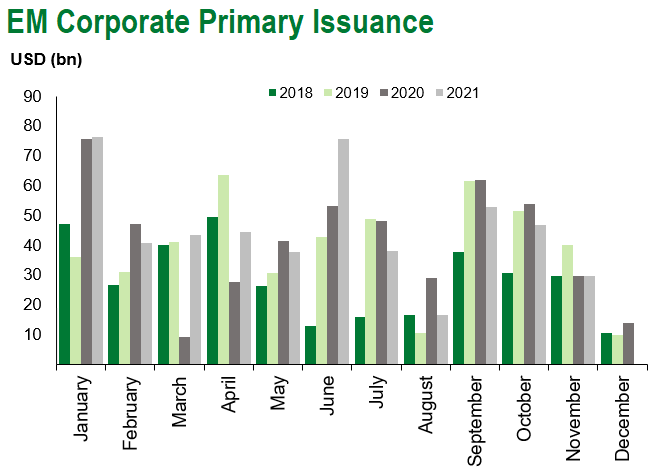
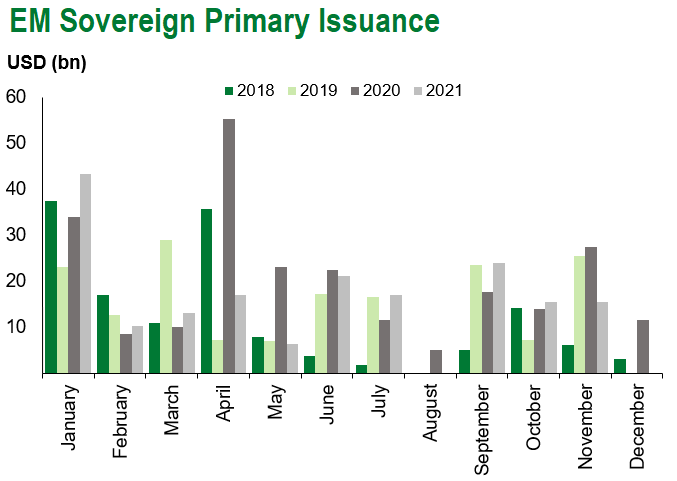
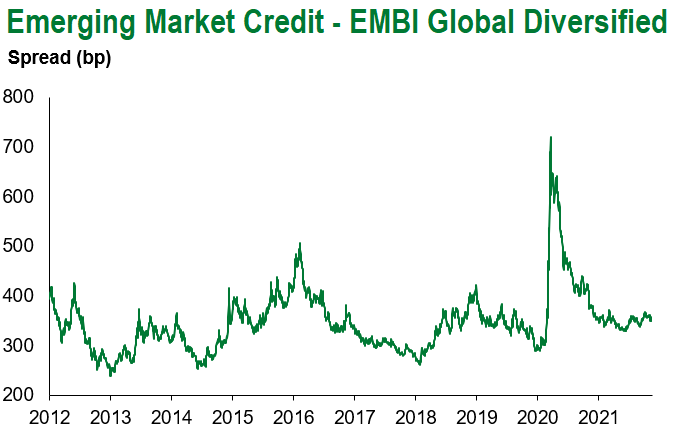
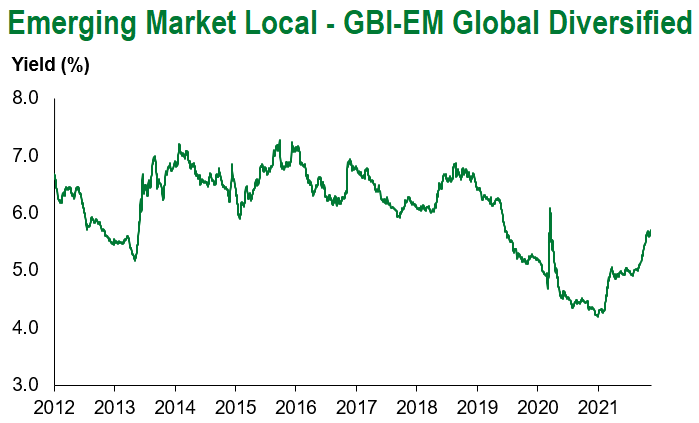
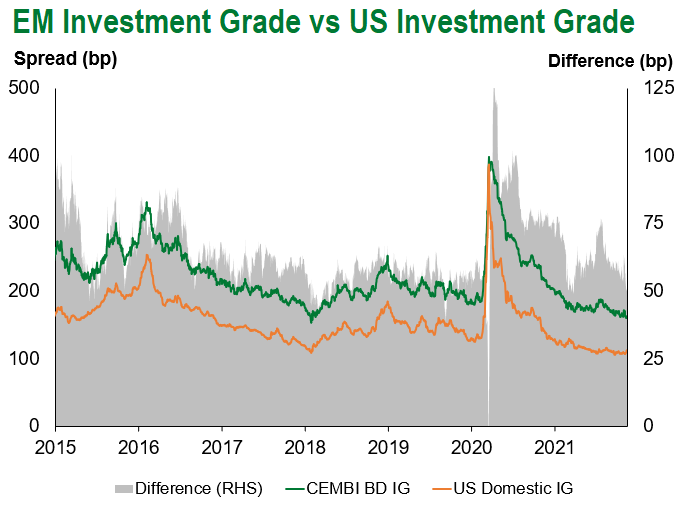
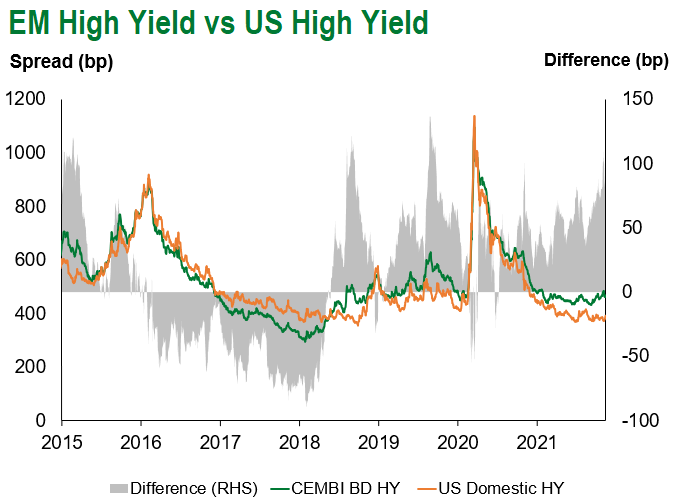
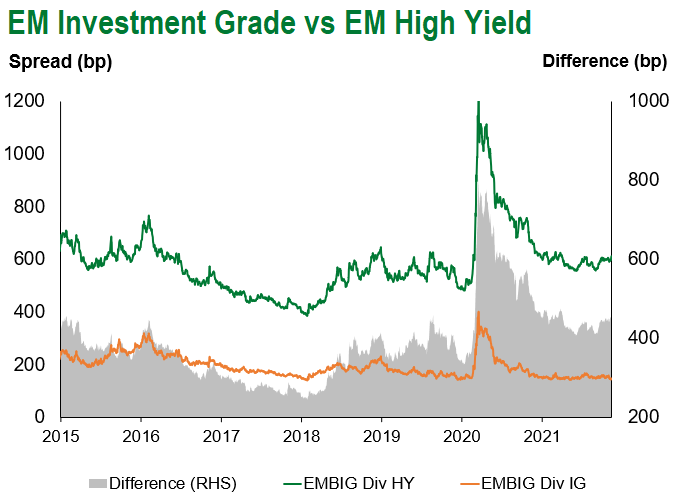
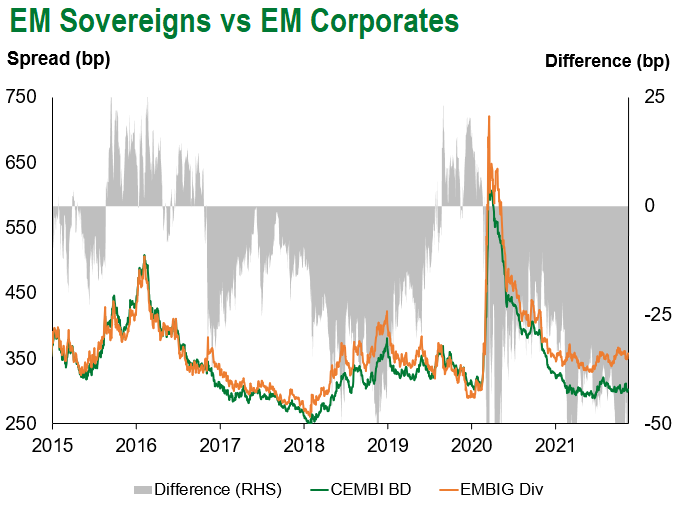
Emerging Markets Flows
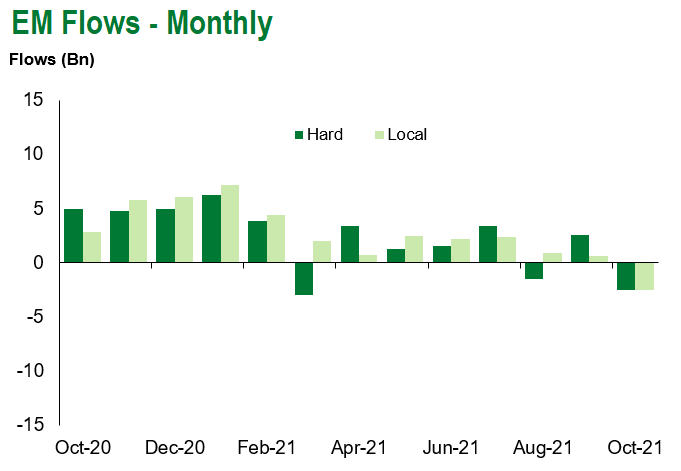
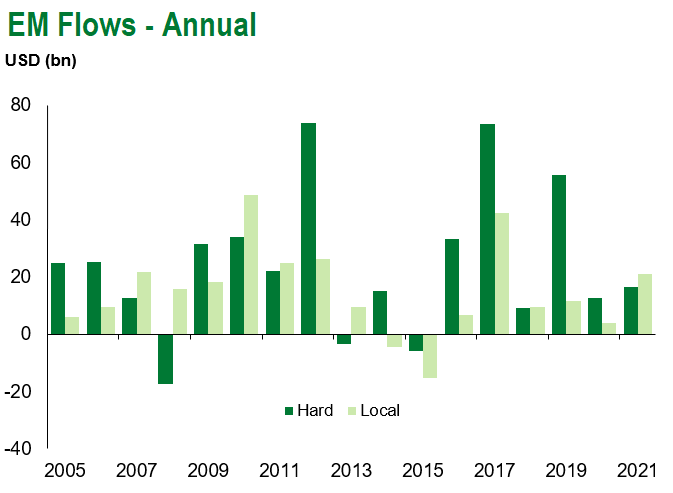
Source for graphs: Bloomberg, JPMorgan, Gramercy. As of November 19, 2021.
COVID Resources
Emerging Markets COVID-19 Case Summary
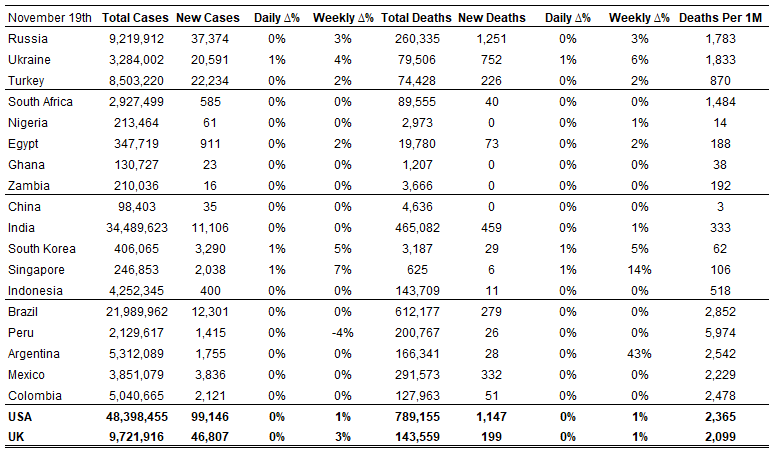
Source: Worldometer as of November 19, 2021.
Additional Crisis Resources:
Johns Hopkins COVID-19 Case Tracker
For questions, please contact:
Kathryn Exum, CFA ESG, Senior Vice President, Sovereign Research Analyst, [email protected]
Petar Atanasov, Senior Vice President, Sovereign Research Analyst, [email protected]
Tolu Alamutu, CFA, Senior Vice President, Corporate Research Analyst, [email protected]
James Barry, Vice President, Corporate Research Analyst, [email protected]
This document is for informational purposes only. The information presented is not intended to be relied upon as a forecast, research or investment advice, and is not a recommendation, offer or solicitation to buy or sell any securities or to adopt any investment strategy. Gramercy may have current investment positions in the securities or sovereigns mentioned above. The information and opinions contained in this paper are as of the date of initial publication, derived from proprietary and nonproprietary sources deemed by Gramercy to be reliable, are not necessarily all-inclusive and are not guaranteed as to accuracy. This paper may contain “forward-looking” information that is not purely historical in nature. Such information may include, among other things, projections and forecasts. There is no guarantee that any forecasts made will come to pass. Reliance upon information in this paper is at the sole discretion of the reader. You should not rely on this presentation as the basis upon which to make an investment decision. Investment involves risk. There can be no assurance that investment objectives will be achieved. Investors must be prepared to bear the risk of a total loss of their investment. These risks are often heightened for investments in emerging/developing markets or smaller capital markets. International investing involves risks, including risks related to foreign currency, limited liquidity, less government regulation, and the possibility of substantial volatility due to adverse political, economic or other developments. The information provided herein is neither tax nor legal advice. Investors should speak to their tax professional for specific information regarding their tax situation.